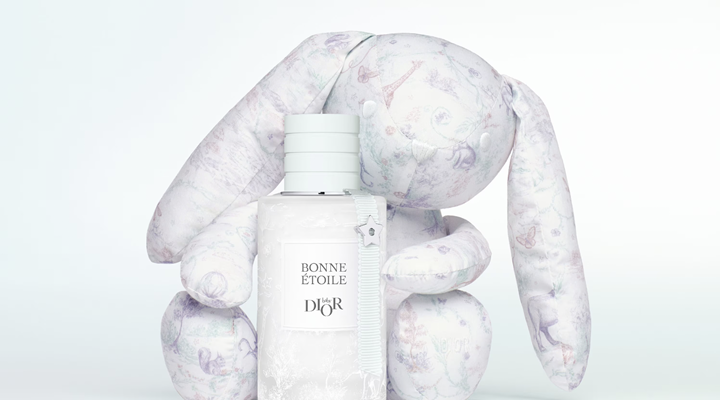This month Dior unveiled a luxuriously-priced line of baby products that set the retail world abuzz. The brand, already known for creating high-end apparel and accessories for adults and children alike, launched an entire bathtime collection including La Mousse Très Fondante, a $95 foaming cleanser for the hair, face, and body, L’Eau Très Fraîche, a $95 cleansing water, and Le Lait Très Tendre, a $115 moisturising hydration milk, and Bonne Étoile (French for Lucky Star) a, $230 water-base
ased fragrance.
The scent and bottle design of the fragrance were designed by Francis Kurkdjian, Dior Perfume’s creative director, and Cordélia de Castellane, the artistic director of Baby Dior, respectively. Kurkdijan is also the perfumer behind well-known scents such as Jean Paul Gaultier’s Le Male cologne and is the co-founder of the luxury fragrance house Maison Francis Kurkdjian.
Describing the launch of the baby-centred collection in an interview with Women’s Wear Daily, Kurkdjian stated, “When I joined Dior in October 2022, one of the projects I had in mind was revisiting Baby Dior. Christian Dior evoked his childhood many times as a very happy and joyful period of his life. The scent and the baby care line were discontinued, and I was eager to bring it back to life as a tribute.”
Dior originally released the baby-focused perfume line called Baby Dior in the 1970s, but it was discontinued until its recent revival this month.
The expanding market for luxury kids’ goods
The launch stirred up ample discussion about the market for luxury baby care products; however, Dior is on a growing list of brands, both accessible and luxury, that are designing fragrances for young children. For example, just last year Hermés released a $116 fragrance called Cabriole for those ages three and up, and even Bulgari sells a $76 child-based perfume dubbed Petits et Mamans.
The hype around these products doesn’t necessarily indicate that brands should be rushing to launch luxurious fragrance products for babies or small children; however, they are a nod to the rapidly growing luxury children’s market as a whole.
In a report conducted by Precedence Research, a market research and consulting organisation, the global baby care products market was valued at $94 billion in 2022 and is expected to reach $158.29 billion by 2032, increasing at a compound annual growth rate of 5.4 per cent.
According to Future Market Insights, the luxury kids goods market alone is projected to be worth $41 million in 2023 and is expected to reach $73 million by 2034, rising at a compound annual growth rate of 5.8 percent.
As Marie Driscoll, an expert on luxury retail and founder and chief analyst at Driscoll Advisors, explained to Inside Retail, “The luxury baby/children market is a natural lifestyle extension to the luxury market generally – with growth driven by the growing numbers of the world’s wealthy and indulgent grandparents and parents. Social media and celebrity have propelled recent growth with the visibility of celebrity children attired in designer and luxury brands that signal hip fashion and create aspirational demand.”
Driscoll pointed to brands such as French business Bonpoint, which has carved out a niche selling luxury apparel and accessories for newborns and children, as well as baby care products, fragrances, and home goods (laundry products, candles, and fragrance), since 1975.
“Luxury baby strollers are also in vogue with the wealthy, such as Bugaboo, Nuna, and Orbit Baby, and designer brands participate in this niche as well, such as Fendi and Versace,” she said.
In addition to the brands Driscoll mentioned, on November 22, French apparel and accessories brand Jacquemus announced the launch of its first kids’ collection available for purchase on its site. The company originally tested out the kidswear market with a capsule collection back in 2021.
With the rising interest in high-end kids’ and baby goods, Dior’s reintroduction of its baby fragrance products was inevitable, Driscoll noted.
“For Dior to launch a fragrance for children is a natural evolution for the brand. Fragrance has been integral to the house of Dior since its beginnings, with Miss Dior in 1947. Twenty years later Dior began dressing children with its first childrenswear line. Given the power of fragrance to change moods, reduce anxiety, and induce calm, Dior’s new scent is a great addition to parenting,” said Driscoll.
What retailers need to keep in mind about this market
As Driscoll stated, one of the key drivers of the luxury baby care market is gifting by parents, grandparents or other relatives and friends of the family.
Whether it’s a costly perfume, a cashmere baby blanket, or a matching parent-child clothing set from a high-end designer, these items are undeniably more about the desires of the parent versus the wants and needs of the actual child.
Juan Campdera, CEO at Aktiva, a brand experience design agency based in Barcelona, noted that the main focus of a deluxe kids’ product should be centred around safe formulations and designs, as well as the personal identity of the parent.
“As the brands have discovered, design should not be focused on being a children’s product, it is a product focused on the mother and her motherhood,” Campdera explained. “The user expects the product to be 100×100 safe, and that represents [their] style, identity and meets [their] emotional expectations.”

